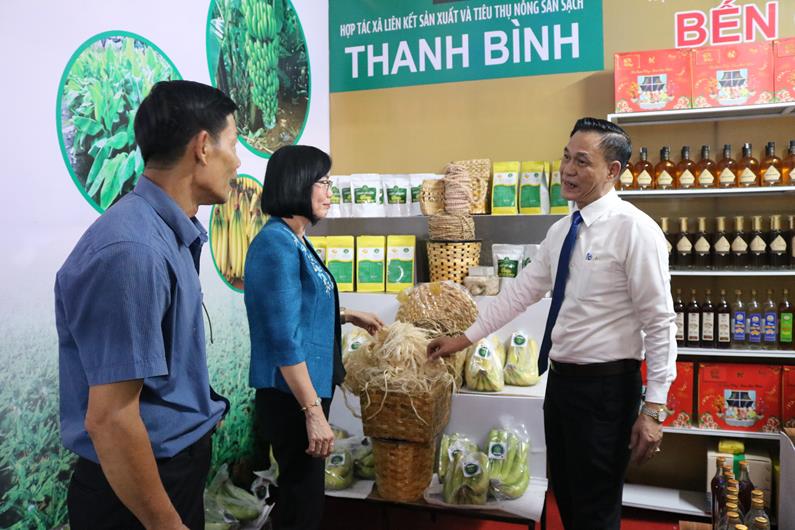(News Portal – Dong Nai) - As an agricultural country, Viet Nam produces a variety of agricultural products for both export and domestic consumption. Besides the main products, a large amount of agricultural by-products are discarded annually, leading to a waste of resources.

Banana fiber products by Thanh Binh Cooperative
Effectively utilizing agricultural by-products such as banana stems, coffee husks, sugarcane bagasse, and pineapple leaves to produce fabric and fibers can reduce agricultural waste, increase farmers' income, and promote greener production practices.
A Potential Source of Raw Materials
In Dong Nai, for example, the potential for producing fabric and fibers from banana plants is significant, yet this resource is currently underutilized. The province has a total banana cultivation area of about 16,000 hectares, concentrated in districts like Trang Bom, Thong Nhat, Xuan Loc, and Dinh Quan.
According to scientists, harvesting one ton of bananas results in approximately 10 tons of waste, including peels, leaves, and especially stems. In the past, banana stems were used as livestock feed. However, nowadays, banana stems are often discarded, leading to waste and environmental pollution, and incurring high costs for cutting and disposal after harvest.
In the province, several enterprises, cooperatives, and production facilities are utilizing banana stems to produce environmentally friendly products, but their numbers remain limited.
Mr. Ly Minh Hung, Director of Thanh Binh Cooperative (Trang Bom District), stated that the cooperative has imported twisting machines to produce and market products such as backpacks, bags, single-use tableware made from banana sheaths, woven mats from banana sheaths, and thermal insulation sheets. Over the past few years, the cooperative has worked to diversify products from banana plants beyond selling fresh bananas. However, they are still in the early stages, and broader commercialization requires more time and collaboration from various parties.
According to Mr. Duong Van Bao, Deputy Head of the Economic Department of Trang Bom District, the district currently has about 6,000 hectares of bananas, with approximately 2,000 hectares in Thanh Binh Commune alone. Utilizing banana stem resources post-harvest can significantly reduce pollution and increase economic efficiency for residents.
Besides bananas, other agricultural by-products also hold great potential. This is why NEXTEVO Vietnam Co., Ltd., a startup from Singapore, invested in a plant in Nhon Trach District. Viet Nam, being the third-largest textile exporter globally, was chosen for investment, and the area is also an active economic zone near seaports. NEXTEVO sources pineapple fibers from the Philippines, Indonesia, East Africa, and soon, Viet Nam and India. This diverse and scalable supply reduces climate risks and ensures a continuous supply of raw materials.
Applying Technology to Create Valuable Products
Mr. Ly Minh Hung, Director of Thanh Binh Cooperative, shared that they are initially collaborating with Kusano Sakko Inc (Japan) to exchange banana stem processing technology, leading to more high-quality, internationally standardized products. This collaboration will open significant opportunities for the cooperative, enabling the full utilization of banana stems, reducing waste, and reinvesting.
Mr. Kusano Takatomo from Kusano Sakko Inc expressed the company's desire to collaborate with Dong Nai Province to implement a banana stem processing project to create cellulose (a raw material for Bio Resin – biodegradable plastic) and produce organic fertilizers. Recently, the Department of Science and Technology engaged with both parties on potential collaborations. Director Lai The Thong of the department emphasized that Dong Nai is focusing on achieving Net Zero goals, prioritizing projects with environmentally friendly processing technologies. The department and related units are ready to support and facilitate this collaboration.
Similarly, Mr. Harold Koh, founder and CEO of NEXTEVO, stated that pineapple fiber products can be customized for spinners, yarn manufacturers, and brands, allowing flexibility across the industry, from raw materials to semi-finished textiles. The company aims to collaborate and introduce this sustainable fiber to the textile industry, as it can be mass-produced at their facility to best serve customers.
Dr. Pham Thi Hong Phuong, Head of the Chemical Industry Department at Ho Chi Minh City University of Industry, and her research team have also invested in Thanh Binh Green Technology Co., Ltd. (Trang Bom District) to produce fabric and fiber from banana stems. Dr. Pham Thi Hong Phuong mentioned that banana fiber is an ideal plant-based material alternative to silk. Their products are being processed for supply to Taiwanese partners.